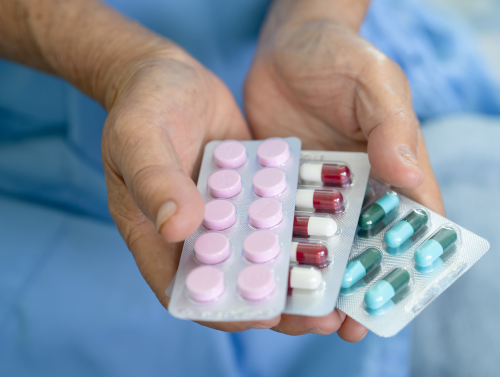The discovery and development of antibiotics revolutionized modern medicine, dramatically improving survival rates for patients with bacterial infections. However, decades of overuse and misuse have led to a serious problem: decreased effectiveness of these vital drugs worldwide.
What Are Antibiotics?
Antibiotics are substances that stop bacteria from growing or kill them outright. They may be made from natural sources or synthesized in a laboratory. Researchers continually develop new antibiotics to fight infections.
Bacteria are microscopic living organisms found in and on your body—and most are harmless or even helpful. Some bacteria, such as those in your gut or on your skin, support good health. But certain types can cause illness ranging from mild infections to life-threatening diseases.
Antibiotics are essential tools for treating bacterial infections and can be lifesaving. However, using them when they aren’t needed—such as for viral infections like colds or the flu—can cause unnecessary side effects and contribute to antibiotic resistance.
How Do Antibiotics Work?
Antibiotics either kill bacteria or stop them from multiplying. Some destroy vital parts of bacterial cells, such as their walls or DNA, while others block the production of proteins bacteria need to reproduce. Antibiotics come in many forms, including pills, liquids, creams, ointments, and injections.
It’s important to remember that antibiotics don’t work against viruses. Using them to treat viral illnesses can do more harm than good.
Overusing antibiotics has led to new strains of bacteria that no longer respond to treatment—a phenomenon known as antibiotic resistance.
What Are Resistant Bacteria?
According to Johns Hopkins Medicine, every time you take an antibiotic, some bacteria are killed—but others may survive if they’re resistant. Over time, these resistant bacteria can multiply, making infections harder to treat. Contrary to common belief, it’s the bacteria, not your body, that become resistant to antibiotics.
Taking antibiotics unnecessarily or not as prescribed increases the risk of developing resistant bacteria. As a result, some diseases that were once easily treatable are now becoming nearly impossible to cure.
What Are Prophylactic Antibiotics?
Prophylactic (preventive) antibiotics are prescribed to protect against potential bacterial infections. Your healthcare provider may recommend them if you:
- Are undergoing certain surgeries or dental procedures
- Have a medical condition that increases your infection risk
- Have a wound or bite that could become infected
What Are Broad-Spectrum Antibiotics?
Broad-spectrum antibiotics target many different types of bacteria. Examples include quinolones and tetracyclines. These medicines can be useful when the specific bacteria causing an infection are unknown.
However, using broad-spectrum antibiotics unnecessarily can accelerate antibiotic resistance. Your provider will only prescribe one if it’s clearly needed.
Benefits and Risks of Antibiotics:
Benefits include:
- Clearing bacterial infections
- Easing symptoms and speeding recovery
- Preventing infection spread
- Protecting against serious complications
- Saving lives
Possible side effects include:
Common (usually mild):
- Diarrhea
- Nausea or vomiting
- Dizziness
- Rash
- Yeast infections
Less common (but more serious):
- C. difficile infection
- Severe allergic reactions (including anaphylaxis)
- Toxic effects on certain organs
Always read the medication instructions carefully and contact your provider with any side effects or concerns.
Can You Be Allergic to an Antibiotic?
Yes. Allergic reactions to antibiotics can range from mild (itchy rash or hives) to severe (swelling, blistering, or breathing problems).
Call 911 or seek emergency care immediately if you experience symptoms of a severe allergic reaction—quick treatment can save your life.
Do Antibiotics Affect Gut Health?
Because antibiotics kill both harmful and beneficial bacteria, they can disrupt your gut’s balance and cause digestive issues. A diet rich in probiotics can help restore good bacteria.
If you experience persistent diarrhea, abdominal pain, nausea, or fever while taking antibiotics, contact your healthcare provider—these may be signs of a C. difficile infection, which can be serious.
Staying Healthy While Taking Antibiotics
Infectious disease expert Ghinwa Dumyati, MD, and emergency physician Bohdan Klymochko, DO, of the University of Rochester Medical Center, offer these key tips:
- Follow your prescription exactly as directed.
- Finish the entire course, even if you feel better early.
- Take your doses at the same time each day.
- Watch for side effects or allergic reactions.
- Tell your provider about all medications, supplements, or herbal remedies you use. Some antibiotics can interact with birth control pills and other drugs.
- Avoid alcohol, which can interfere with antibiotic effectiveness.
- Don’t save or share leftover antibiotics.
- Ask your provider if a high-quality probiotic could help support your gut health.
In Summary
Antibiotics remain one of medicine’s greatest achievements in fighting bacterial disease. But they are powerful drugs that must be used responsibly. Taking antibiotics only when truly needed—and exactly as prescribed—helps protect both your health and the effectiveness of these lifesaving medicines for future generations.
- https://my.clevelandclinic.org/health/treatments/16386-antibiotics
- https://www.urmc.rochester.edu/news/publications/health-matters/antibiotic-dos-and-donts-tips-for-staying-healthy-while-taking-an-antibiotic
- https://www.hopkinsmedicine.org/health/wellness-and-prevention/antibiotics
Disclaimer:
The content provided in this article is for informational and educational purposes only and is not intended as medical advice, diagnosis, or treatment. Always consult a qualified healthcare professional before making any changes to your health regimen, starting new therapies, or discontinuing existing treatments. Mention of specific practices, therapies, or organizations does not constitute an endorsement. The views expressed are those of the author and may not reflect the policies or positions of any affiliated entities.

